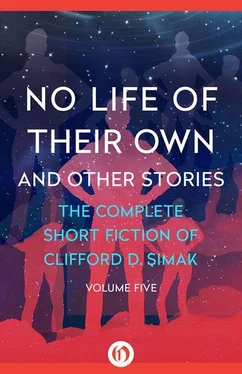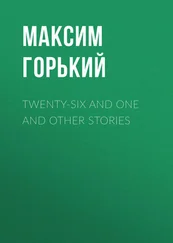Hugh nodded. “More seeds. And more bugs going out. And the worst of it is that Earth doesn’t know. No man in his right mind on Earth could even dimly speculate upon the possibility of high intelligence in plant life. There’s no reason to. No precedent upon which to base such a speculation. Earth plants have never had intelligence.”
“A message is all we need,” declared Scott. “Just get word to the Earth. They’d root up every plant on the face of the entire globe. They’d …”
He stopped abruptly and stared out across the desert.
“The rocket,” he whispered. “The rocket is going to Earth!”
Hugh swung on him fiercely.
“What are you …”
“We could send a message by the rocket!” yelled Scott. “They always watch for them … always hoping each one will carry something new. Some new thing from Mars. It’s the only way we can get a message back to Earth.”
“But they won’t let us near,” protested Hugh. “I’ve tried to get up close to the cradle when they were launching one and those machines always drove me away. Didn’t hurt me … but threatened.”
“We have guns,” said Scott.
“Guns,” said Hugh, “wouldn’t be worth a damn against them. The bullets would just glance off. Even explosive bullets wouldn’t harm them.”
“Sledges then,” said Scott. “We’ll make junk out of the damn things. We’ve got a couple of sledges in the ship.”
Hugh looked at him levelly.
“Okay, kid, let’s get going.”
V
The machines paid them no attention. No higher than a man’s waist, they curiously resembled grotesque spiders. Gangling rods and arms sprouted out all over them and from their trunks sprouted waving, steel antennae.
Overhead hung a swarm of the metallic bugs, evidently directing the work of making the rocket ready.
“It takes just three minutes or thereabouts from the time they finally have her ready until she blasts,” said Hugh. “Whatever we are going to do has to be done in those three minutes. And we’ve got to hold them off until the rocket blasts. They’ll suspect there’s something wrong and will try to stop it but if we can hold them off …”
“They must already have radioed Earth the rocket is coming,” said Scott. “We always got word days in advance. Probably they won’t follow up with their location messages but Doc will be watching for it anyhow.”
They stood tensed, waiting, each grasping a heavy hammer.
The space about the cradle was a scene of intense, but efficient activity. Last minute adjustments were made. Readings and settings were checked. Each machine seemed to act by rote, while overhead hung the cloud of humming bugs.
“We know what we’re to do,” said Hugh. “We’ve simply got to do it.”
Scott nodded.
Hugh shot a glance at him.
“Think you can hold them off, kid? It’ll take a while to unscrew the inner and outer caps and we have got to get that message inside the inner container or it’ll burn when the rocket hits atmosphere.”
“You just get that message in and the caps back on,” said Scott. “I’ll hold them off for you.”
Suddenly the machines scurried back from the cradle, leaving a clear space of several yards around it.
“Now!” Hugh shouted and the two men charged.
The attack was a surprise. Their rush carried the line of machines between them and the cradle.
One machine barred Scott’s way and he smashed at it savagely with the heavy hammer. The blow flung it aside, crippled, dented, half-smashed.
Hugh was already at the cradle, clambering up the superstructure.
A machine rushed at Scott, steel arms flailing. Ducking a murderous swipe, the Earthman brought his sledge into play. It sheared through the arms, smashed into the body of the machine. The stricken mechanism seemed to reel, staggered erratically, then collapsed upon the sand.
In two leaps Scott gained the superstructure, scaled it and straddled the cradle. His sledge smashed savagely upon a climbing mechanism, flung it to the ground. But others were swarming up the steel lattice work. Tentacles snaked out, seeking to entrap him. A wicked blow on the leg almost brought him down.
His sledge worked steadily and at the foot of the cradle broken mechanisms bore testimony to its execution.
Out of the corner of his eye he saw that Hugh had inserted the envelope carrying the message in the inner container with the seeds, was tightening the screwcap. All that remained was to screw on the larger, heavier outer cap.
But only seconds must remain, precious seconds before the rocket blasted. And before that happened they had to be away from the cradle, for the back-lash of flames would burn them to a cinder.
Scott felt perspiration streaming over his body, running off his eyelids, blearing his sight, trickling down his nose. He heard the rasp of metal as Hugh drove home the cap with savage thrusts of the wrench.
A machine rushed up the lattice at him and he smashed at it with unreasoning fury. The head of the sledge bit deep into the metal body.
A tentacle wrapped about his leg and jerked. He felt himself losing his balance, tumbling off the cradle into the melee of threshing metal things beneath him.
Then he was on the ground, buffeted and pounded by the maddened metal creatures. He fought savagely, blindly staggering forward. The shatterproof glass in his vision plate had been “broken,” its texture smashed into a million tiny criss-cross lines, until it was like frosted glass.
He heard the tough fabric of his suit rip with a screeching sound. The bugs still were hammering against him.
The thin, acrid atmosphere of Mars burned into his nose and his lungs labored.
Unseeingly, he swung his sledge in swath-like circles. Shrieking like a wild Indian, he felt it smash and slam into the bodies of his metallic opponents.
Then the world was blotted out by a resounding roar, a Niagara of sound that beat in waves against one’s body.
That was the rocket leaving.
“Hugh!” he yelled insanely. “Hugh, we did it!”
The attack had fallen away and he stood unsteadily on his feet, panting, stiff from punishment, but filled with exultation.
They had won. He and Hugh had sent the message. Earth would be warned and Mars would lose its hope of conquering a new and younger world. Whatever dreams of conquest this old red planet may have nurtured would never come to be.
He put his hands up and ripped the helmet from his head, flinging it on the ground.
The metallic machines were ringed around him, motionless, almost as if they were looking at him. Almost as if they were waiting for his next move.
Wildly he whooped at them. “Start something, damn you! Just start something!”
But the line in front of him parted and he saw the blackened thing that lay upon the sand. The twisted, blasted, crumpled thing that huddled there.
Scott dropped his sledge and a sob rose in his throat. His hands clenched at his side and he tottered slowly forward.
He stood above the body of his brother, flung there on the sand by the searing back-lash of the rocket blast.
“Hugh!” he cried, “Hugh!”
But the blackened bundle didn’t stir. Hugh Nixon was dead.
Eyes bleared, Scott stared around at the machines. They were breaking up, scattering, moving away.
“Damn you,” he screamed, “don’t you even care?”
But even as he spoke, he knew they didn’t care. The plant civilization of Mars was an unemotional society. It knew no love, no triumph, no defeat, no revenge. It was mechanistic, cold, logical. It did only those things which aimed at a definite end. So long as there was a chance of protecting the rocket, so long as there was hope of halting its flight after it had been tampered with, that civilization would act. But now that it was in space, now that it could not be recalled, the incident was over. There would be no further action.
Читать дальше












